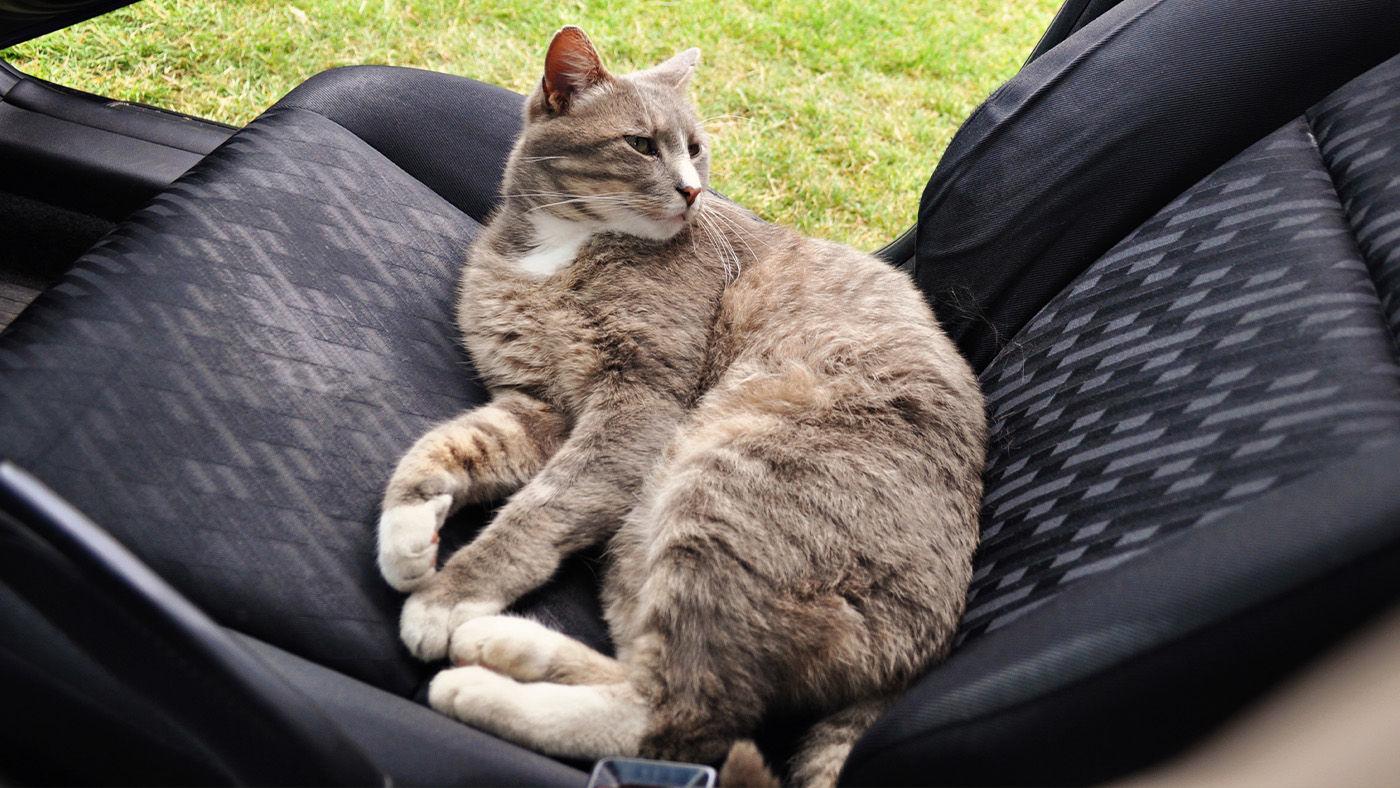Indoor vs outdoor cats: Do cats need to go outside?
Discover the pros and cons of indoor vs outdoor cats to decide what’s right for your feline
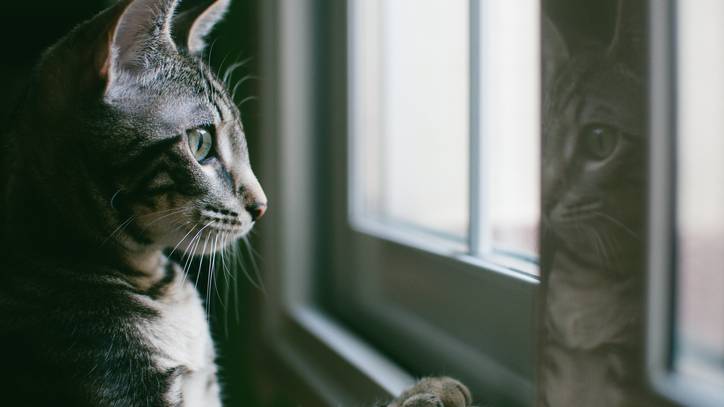
Indoor vs outdoor cats is an ongoing debate between cat owners. While some cats love to explore the yard and surrounding neighborhood, others are happier curled up on the sofa in the warmth of your home.
Whether you decide to keep your cat indoors or let them roam free outside, the important thing is to understand the pros and cons of both so you can ensure your furry friend is as happy, healthy and safe as they can be.
If you are worried about the risks of letting your cat outdoors, you can keep them inside. Cats don’t need to go outside. However, you need to make sure you know how to entertain indoor cats to keep them mentally and physically stimulated.
On the other hand, if you want them to enjoy the benefits of getting fresh air and exercise, there is plenty you can do to ensure their safety; from making sure their vaccinations are up to date to providing them with an outdoor cat enclosure or a catio. Read on to find out everything you need to know about indoor vs outdoor cats.
- Best outdoor cat enclosure: Keep your feline safe while it explores the outdoors
- Caring for outdoor cats: How to keep them safe and healthy
- Best toys for indoor cats: Keep your furry friend active
Do cats need to go outside?
Like their wild ancestors, domestic cats are predatory by nature. Being outdoors allows them to simulate their wild behaviors such as hunting and chasing. It also stimulates them both physically (through exercise) and mentally (as they enjoy exploring and going on adventures).
However, cats do not need to go outside to be happy or healthy as long as they are in an indoor environment where they receive enough physical and mental stimulation.
This includes providing them with lots of space, places to exhibit their natural behavior such as scratching posts and climbing trees and mental stimulation through interactive play (chasing a ball or playing a puzzle toy).
Keep the windows open for fresh air or better still provide them with an outside cat enclosure or catio or train them so you can take them out on a leash.
Bring the outdoors in with cat-friendly plants such as cat grass or perches next to windows so that your cat can sit in the sunshine and watch the birds outside.
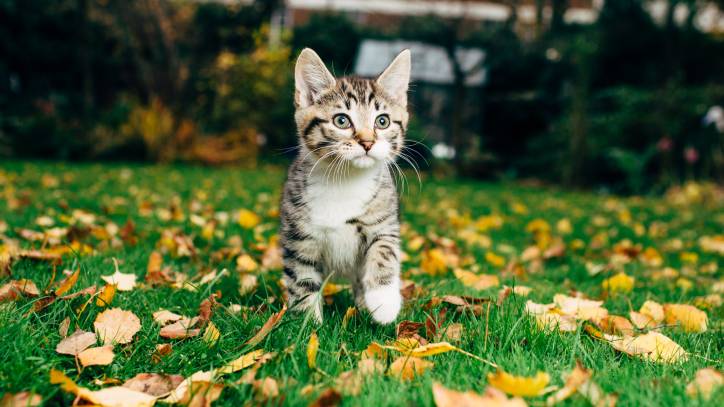
Is it cruel to keep cats indoors?
It’s not cruel to keep cats indoors as they can be perfectly happy and healthy indoors and there are many benefits over outdoor cats (safety for one). However, if you do want indoor cats, it’s best to keep them indoors from kittens as this makes it easier.
Can outdoor cats be indoor cats?
While a cat that has experienced the outdoor may be distressed if forced to live indoors all of a sudden, most cats will adapt to living indoors over time as long as they are getting enough stimulation.
This change may need to be gradual to keep your cat happy. An alternative is keeping them indoors but making sure they have an outdoor enclosure or catio.
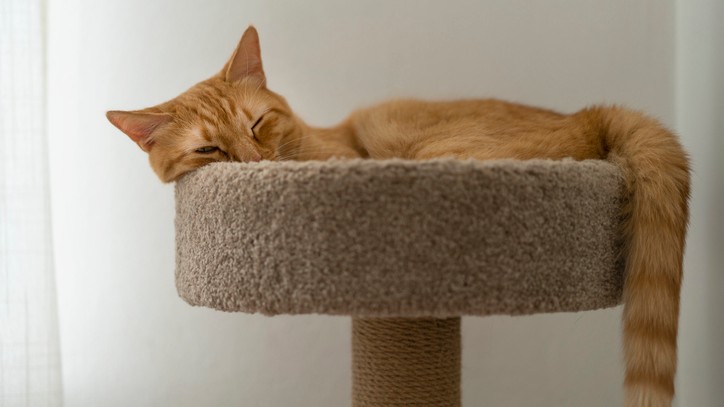
Do outdoor or indoor cats live longer?
Indoor cats tend to live on average around 10-15 years, whereas outdoor cats generally live around 2-5 years. While outdoor cats do get more exercise and sunshine, there are a number of risks such as traffic, disease and other wild animals that indoor cats don’t face.
While indoor cats tend to be healthier and live longer, if they do not get enough physical stimulation they can also be at risk of diabetes, obesity, arthritis and heart disease.
Will a cat’s behavior change if he goes outdoors?
Your cat’s behavior may change if they are allowed out. A cat that is given the freedom to roam is less likely to become bored and frustrated. This in turn may mean fewer behavioral issues when they are indoors such as scratching the furniture, peeing outside of their litter box and being aggressive.
However the risks they face outdoors could also change their behavior negatively. They may suffer from trauma if they get into a fight with another cat or may come home and start acting strangely if they’ve suffered an injury like being hit by a car or if they get fleas.

Benefits for indoor / outdoor cats
There are advantages for both keeping your cat indoors and letting them go outside:
Pros for indoor cats
- Safety Indoor cats are safer inside as they are not at risk from traffic, diseases and parasites, being injured by other animals, getting lost or being taken.
- Health Indoor cats tend to be healthier and live longer because they are not as exposed to diseases injuries or bad weather.
Pros for outdoor cats
- Fresh air Outdoor cats are able to enjoy the health benefits of fresh air and sunshine.
- Exercise Outdoor cats get more exercise.
- More space and mental stimulation Many cats enjoy the excitement of exploring the outdoors and exhibiting natural behaviors such as hunting and chasing.
Risks for indoor/ outdoor cats
Equally, there are disadvantages for both:
Cons for indoor cats:
- Boredom If indoor cats do not get enough stimulation they can become bored, frustrated and even stressed.
- Obesity If indoor cats do not get enough exercise they may become overweight and could suffer from diabetes and heart disease.
- Hunting If they are unable to go outside they won’t be able to hunt for mice and exhibit the natural behaviors of their wild ancestors.
Cons for outdoor cats:
Health and safety Outdoor cats are more at risk of getting hit by a car, getting a disease such as rabies or a parasite such as fleas. They may get injured in fights with other animals, be poisoned or get taken by humans. You might also be wondering can cats find their way home - this feature has the answer.
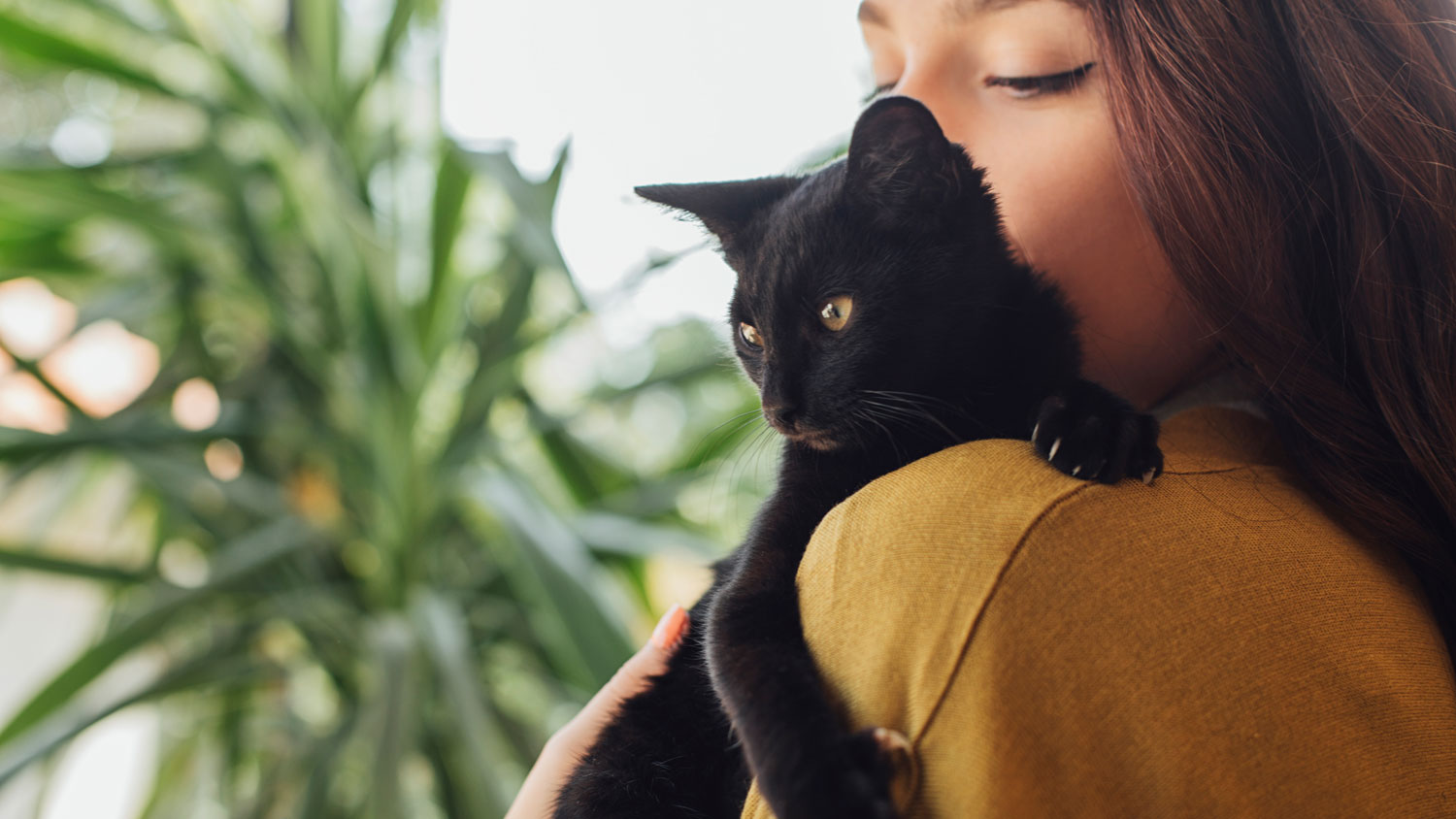
How to keep a cat safe outdoors
Keep your cat safe with a few simple tips:
- Make sure their vaccinations are up to date so if they do pick up a disease their body can fight it.
- Spay or neuter your cat.
- Make sure they wear a safe collar with ID and GPS tracker and that they are microchipped so you can find and identify them and so they are not confused with a stray and taken by animal control.
- Give them flea and tick prevention medication to avoid the risks of parasites.
- Try to train them with treats to come back inside and call them in before dark when they are more at risk.
- Train them to walk on a leash so you can take them for walks outside safely.
- Build them an outdoor enclosure or catio so they can be in a safe outdoor space.
If you're questioning, 'How long do cats live?' this feature has the answer.
How to keep indoor cats stimulated
Make sure your cat is physically and mentally stimulated indoors with these tips:
- Interactive play Spend time actively engaging and playing with your pet to keep their mind and body stimulated.
- Scratching posts The best scratching posts not only provide your feline friend with exercise but give them more space and let them exhibit their natural behaviors.
- Toys It’s a good idea to always have new and varied toys. Look for the best cat toys to keep them entertained. Puzzle toys simulate hunting for cats who can’t hunt outside. They also love anything they can chase. It can be as simple as a ball on a string.
- Space Make the most of the space in your home. If you have a small apartment, build space upwards with climbing tree towers which they can use to climb and jump on. Create your own cat playground. Try include places for them to hide too.
- Perch Let them explore the outdoors from inside by having somewhere they can perch next to a window where they can get a bit of fresh air and sunshine while watching the birds (but one they can’t escape out of).
- Cat grass or catnip A bit of greenery indoors such as cat grass for your cat to chew on will bring the outside in and help stimulate them more.
- Catio Provide your indoor cat with a catio or outdoor enclosure so they can be an outdoor cat without the risks
- Leash Train your cat to walk on a leash so you can take them outside safely.
If you decide to keep your cat outdoors, you might need to learn how to install a pet door. This step-by-step guide is here to help. Living in a rented property and need a damage-free option? Check out these cat door alternatives.
PetsRadar Newsletter
Get the best advice, tips and top tech for your beloved Pets

